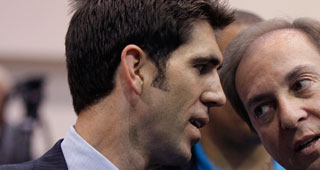As reported, here are the details of the deal:
Miami Heat receive: Toney Douglas (from Golden State)
Boston Celtics receive: Joel Anthony, Philadelphia’s lottery-protected 2014/2015 first rounder that reverts to two second rounders if not sent by then, and a Miami second (from Miami)
Golden State Warriors receive: Jordan Crawford and MarShon Brooks (from Boston)
This is an interesting trade because, as reported, each franchise only trades pieces to one team and only receives them from the other.
For the Warriors
In many ways, this acknowledges the biggest misstep of Golden State’s offseason: signing a back-up point guard who should not be a primary ballhandler. Toney Douglas has been a solid defender and player off the ball earlier in his career, but was a terrible fit for this second unit because Kent Bazemore, Draymond Green and Harrison Barnes have trouble creating for others and usually themselves as well.
Mark Jackson should have adjusted to this reality by staggering Stephen Curry and Andre Iguodala’s minutes in order to have a creator on the floor more of the time but the dominance of the #FullSquad starting lineup made shifting either David Lee and/or Iguodala’s minutes a less desirable proposition. With those constraints, a move had to be made.
What Jordan Crawford brings is that Nate Robinson-esque quality to generate and take shots. He may also use some of the ability to create for others that was cultivated in Boston, which would be a huge benefit. The Warriors have been terrible offensively without Curry on the floor and even Crawford at his worst would make that better.
MarShon Brooks is another lottery ticket that may actually be able to contribute or net a small asset (think late second rounder) if the team decides to move him again before the deadline. Also, playing Crawford alongside Kent Bazemore should allow Bazemore to defend opposing point guards some of the time while not handling the ball, which represents Bazemore’s ideal bench role.
Would a more established and reliable point guard have been a better option? Sure. However, it seems unlikely that a superior fit like Kyle Lowry or Kirk Hinrich could have been acquired without giving up assets. Since the Warriors cannot trade picks for a while and do not have a logical piece on roster, those moves became less likely once the Bulls got under the luxury tax by trading Luol Deng. There is also an outside chance that Crawford can handle some possessions with Curry to allow him to play off the ball.
One other interesting facet of the trade is the fact that while MarShon Brooks will be an unrestricted free agent this summer, whoever has Crawford at the end of the year retains his restricted rights. While that could allow Golden State to retain him if they want, it could also be used to get a trade exception from whatever team wants to pay Crawford because the signing team loses very little by giving the Warriors that flexibility. That TPE could then be used to acquire a bench player later in the summer despite Golden State being over the salary cap. Potentially, that could mean a respectable rotation piece that keeps them under the luxury tax for another season. If he plays well, that could even be Crawford though I fully expect it to be someone else.
Grade for Golden State: B+
For the Celtics
I fully understand the desire to get at least some assets for expiring contracts like Crawford and Brooks that they were not likely to retain. However, in terms of what Boston got back they may have sold low on Crawford despite trading him at his (at least short-term) peak value.
The Philadelphia pick is protected 1-14 for each of the next two seasons and then becomes two second round picks if not conveyed by then. Considering the Sixers absolutely will not make the playoffs this year, the only way Boston gets a first is if they make it in 2014-15. That could be possible with a healthy Nerlens Noel and a quality draft but they might still be one year away. The second rounders could be decent but not extremely valuable.
Another meaningful consideration is what I said about Crawford above in regards to his RFA rights. However, Boston should expect to have cap space of their own this summer so the value of a trade exception goes down sharply and the major benefit of RFA rights comes from the ability to retain the player, which appears to not have much value to Boston.
Finally, the Celtics did take on some salary for next season in Joel Anthony though it should not preclude them from making any big moves since bigger names like Rajon Rondo, Gerald Wallace and Jeff Green are signed past next season anyway.
Grade for Boston: D+
For Miami
Most of the criticisms levied on Toney Douglas in the Golden State section do not apply to Miami since they have LeBron James and Dwyane Wade to handle the ball while other players defend opposing point guards. Douglas should fit right in there as a third point guard and utility guard in a system that makes substantially more sense with what he does well.
On top of that, the move saved Heat ownership lots of money in terms of the luxury tax, as well as a roster spot and salary for a limited value player next season. Roster spots mean more to the Heat than any other NBA franchise because they can get minimum salary players who can actually contribute.
Losing the Philadelphia potential first takes a little bit of the shine off it since any team in the East could make the postseason next year but not a ton since it feels unlikely.
Even then, Miami added a more useful piece this season and saved money while adding flexibility as well.
Grade for Miami: A-



